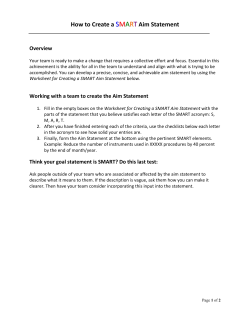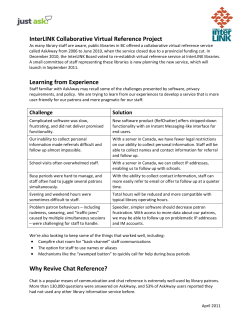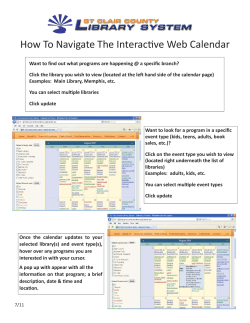
Iowa Library Technology Grant Application Application Deadline: November 1, 2013
Iowa Library Technology Grant Application Application Deadline: November 1, 2013 Read through this application and instructions before you begin the application. Provide answers to all questions. Incomplete applications will not be considered. Provide as much detail as you can. 1. Name of Library or Group: Sioux-Plymouth Consortium: Le Mars, Hawarden and Sioux Center Public Libraries 2. Name of Library that will serve as fiscal agent if a group is applying: Le Mars Public Library 3. Contact Name: Sue Kroesche 4. Contact Telephone number: 712-546-5004 5. Contact e-mail address: kroesche@lemars.lib.ia.us 6. Contact Address: 46 1st St SW 7. City/Zip: Le Mars, Iowa 51031 8. Project title: Smart TVs at the Library 9. Grant amount requested: $4500 10. Do you have local funding for this project? If so, how much? Local Library contributions: $750 @ 3=$2,250 11. Describe your project. Include information about implementation, goals and objectives, project schedule and budget. This project seeks to equip three community libraries, Hawarden Public Library, Sioux Center Public Library, and the Le Mars Public Library with Smart TVs to encourage project sharing among the libraries and community exposure to Web 2.0 capabilities. In the past, these three libraries have blurred county lines by forming a consortium to share Zinio online magazines, and to share One-Click Digital downloadable audiobooks. This history of collaboration lends itself to this project using current technology with a Smart TV. The Smart TV will contribute to our libraries being places where communities grows and flourish. A Smart TV, sometimes referred to as a connected TV or hybrid TV, (not to be confused with IPTV, Internet TV, or with Web TV), describes a trend of integration of the Internet and Web 2.0 features into television sets and set-top boxes, as well as the technological convergence between computers and these television sets / set-top boxes. The devices have a higher focus on online interactive media, Internet TV, over-the-top content, as well as on-demand streaming media, and home networking access, with much less focus on traditional broadcast media than traditional television sets and set-top boxes. Similar to how the Internet, Web widgets, and software applications are integrated in modern smartphones, the name "smart TV" is similar to "smart phone". The technology that enables smart TVs is also incorporated in devices such as DVRs, Blu-ray players, game consoles, hotel television systems, and other devices. These devices allow viewers to search and find videos, movies, photos and other content on the Web, on a local cable TV channel, on a satellite TV channel, or on a local storage drive. With funding for this project, each library will purchase a large (70”) Smart TV for their library. Each library plans to purchase from a local vendor to promote the local economy and to have service readily available. Once the Smart TV is installed, the technology will be used for a variety of shared experiences. A local author will be chosen with his or her book being read by all three libraries and conclude with a discussion over Skype. We would also like to repeat this occurrence among the libraries at a children’s level during “Read Across America” Week or the summer reading program. Story hours and early literacy programs will be prime candidates for using the Smart TV capabilities. Stories can be shown on the screen using digital, interactive books or tied in with other Ipad games and programs. Also, libraries can connect with the many resources available through IPTV to promote early literacy. These resources can be shared during story times and toddler times with parents and caregivers. Since the Smart TV will be placed in libraries’ meeting rooms, the use broadens on a far larger scale – showing movies with the streaming capabilities, showing video clips for programs, using the internet for program, and more. When providing technology programs, each library will be able to demonstrate using their online resources with the advantage of a large screen that all can see. This is a much better avenue for our patrons than the small TV or grainy projector that many of us currently use. The technology of the Smart TV will also be shared with our local businesses – they may partner and use the library for webinar events, training, or meetings that can be viewed on the larger screen. Each of the libraries involved will develop a tech talk which will be shared and presented via Skype for the staff and patrons of the other libraries named in this grant application. Possible subjects could include setting up an email account, using Google Drive, or downloading books. The possibilities are endless. However, we save time and staff by partnering in the development of the tech talks. Rather than developing three, each library will develop one. The Smart TV’s will also be used by each library for staff training and demonstrations to patrons of databases including but not limited to Wilbor, Freegal, EbscoHost, and Library Express. The larger images should help patrons learn and digest the materials. The demonstrations via the Smart TV are a means to see, to learn, and to ask questions of the presenter. Goal 1: To promote technology and resource sharing among our library communities and staff Objective 1 – Purchase a large Smart TV which can be wall-mounted for each library Objective 2-- Develop a policy for use of the Smart TV technology with our library for staff and patrons Objective 3-- Joint library staff training on uses of Smart TV – examples such as Skype, various apps, streaming videos and other technology Objective 4-- Prepare press release about shared activities for area media Objective 5-- Jointly develop a general evaluation survey Goal 2: To introduce a higher level of technology to our communities. Objective 1 - Meet as a group of three libraries to plan shared activities for patrons aimed at one shared activity per calendar quarter Objective 2 – Each library will hold additional tech training classes for their own patrons six times a year Objective 3 – Staff will be able to train patrons for future use. Project Schedule: January 2014 Purchase Smart TV and install at each library Begin work on policy for each library Begin planning via a wiki for the shared activities of the three libraries February Staff training on use of the Smart TV March Finalize shared activities plans Submit status report to State Library of Iowa April Kickoff for Smart TV Week 3 tech programs held library will present for National Library activities activities during National Library via Skype during that week—each one. Each library plans an open house Week with Smart TV as part of the June First week of June—Book/Author Skype with Local Author with all three having read the same book July Submit Final Report/ Evaluation of Project Project Budget: 3 Smart TV’s (Amount received through grant) $4,500 ($1500 per library) Local Library Contributions Each library will contribute this amount to Be applied to the following: Wall mount Sound bar Installation costs $750 @ 3 = Total cost of completed project: $6,750 $2,250 12. What is the economic need of your library or group of libraries? Our three communities average a 70% qualification for free and reduced meals. All of our communities have community dinners for those in need, as well as food banks. This proves that often those who are distressed or hurting may be hidden in our community. Our communities also feel that there is a need for weekend meals and, therefore, weekend backpack meals have been provided for those in need. One of our communities has a twenty-five percent Hispanic population. In addition, we are all classified as “rural” which often means that some residents do not have the benefit of the technology that those living in an urban area would have. The library is where they can come for instruction, evaluation, and help! In addition, each of the libraries has seen budget cuts; or budgets have remained the same during the last few years. Our dollars are buying more formats, with limited capability to fund “new” technology. 13. How will this project improve the lives of the citizens in your community? We introduce our citizens to new technology. We train them on its uses and benefits in their lives. Our libraries are the go-to places for information on technology in our small communities. We furnish our patrons with the tools they do not have at home or cannot afford thereby enabling them to be competent in their workplace or personal lives. This technology will allow us to bring in programs that may not be available to all citizens, such as author visits, webinars, and training modules. We would be bringing the world of Web 2.0 to our citizens 14. How is your project unique or how does it demonstrate an innovative use of technology? The three libraries involved in this grant, Hawarden, Sioux Center and Le Mars, are sharing equipment, programs, staff and ideas across county lines. We are sharing resources and staff as we better each other’s communities. We are opening our libraries to growth by sharing planning processes as well as equipment. This is the beginning of the future of our collaboration. We are not bound by city or county lines. We are only limited in our future by what we fail to discover among ourselves and our communities. Our programs with the Smart TV will bring citizens of different communities together as they acquire the knowledge of new technology. It is a win-win program aimed at growth 15. Describe how the project will be evaluated. What are the results you are hoping for with this project? How will you know if the goals and objectives are achieved? After each joint program, participants will be asked to complete a short survey to evaluate the effectiveness of the program and the use of the Smart TV as a tool. We will also track attendance at each of the programs which use the Smart TV. Without this project, it would be difficult to expose our patrons to new technology. Our success or failure depends on: 1) the capability to reproduce our programs for use by others, 2) the ability to expand programs to include other libraries, and 3) active involvement and impact to our communities. We will track how many businesses make use of the library’s Smart TV for webinars or other training. We will survey each library’s staff to determine the success of the teaching techniques and the learning that took place. The planned programming will be a springboard for lifelong learning. We strongly feel that lifelong learning is one of the cornerstones in today’s community library. The citizen responses to the survey will allow us to plan for the future and to know the direction needed to deliver technology and information. Send hardcopies to: Iowa Library Technology Grants Iowa Library Services 1112 East Grand Ave. Des Moines, Iowa 50319 Send e-mail attachments to: grants@lib.state.ia.us Fax to: 515-281-6191
© Copyright 2025









